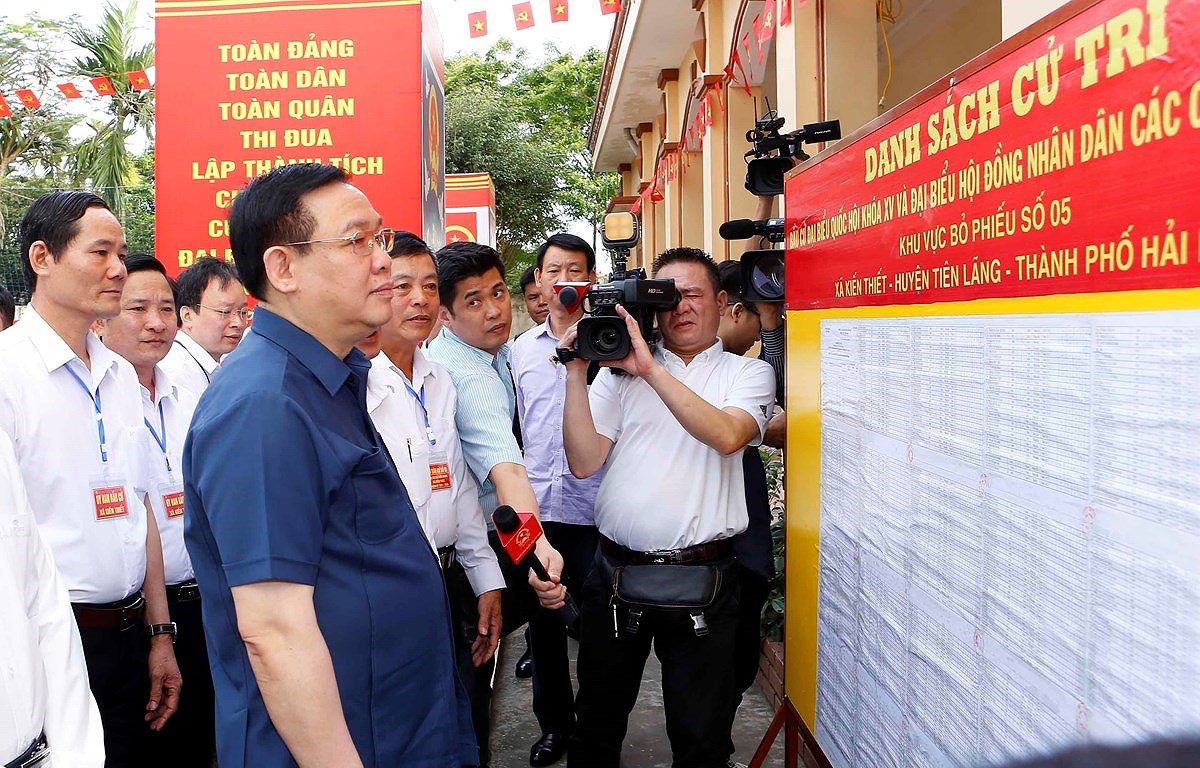 National Assembly Chairman Vuong Dinh Hue inspects election preparations in Hai Phong. (Photo: VNA)
National Assembly Chairman Vuong Dinh Hue inspects election preparations in Hai Phong. (Photo: VNA)Hanoi (VNA) - Taking a vote of confidence is an innovative solution in evaluating officials and motivating them to examine and improve themselves.
Such votes prevent signs of deterioration in political ideology, morality, and lifestyle among officials, facilitating the process of selecting talented and virtuous officials. Votes of confidence are taken under the strict supervision of the National Assembly and People’s Councils at all levels.
The process of conducting votes of confidence is considered a “test” in selecting appropriate people to hold positions of authority.
A vote of confidence not only shows the prestige of officials but also manifests the voice of voters and the hope for good things for the benefit of the country and its people.
At meetings of People’s Councils of provinces and centrally-run cities around the country, localities have continued to conduct votes of confidence in positions elected or approved by the municipal or provincial People’s Councils.
After the success of the vote of confidence in positions elected or approved by the National Assembly at the session, more attention has been paid to taking a vote of confidence at sessions of municipal and provincial People’s Councils. The result of such a vote can serve as a reminder for all officials, helping them self-evaluate the quality of what they have been doing.
Votes of confidence on officials holding positions elected or approved by the National Assembly have drawn major public14th National Assembly attention recently.
According to Ms. Vu Thi Luu Mai, a deputy of Hanoi, people have high hopes in votes of confidence at every National Assembly session. This is part of methods for evaluating officials and an opportunity for righteous leaders to shine.
“A vote of confidence reflects the current situation of the country, covering all aspects from society to foreign policy, national defence and security, and justice,” said former National Assembly Chairman Nguyen Sinh Hung.
He said that evaluation and consideration by deputies has been objective. High votes of confidence are encouragement in work performance, while a low vote requires officials to make greater efforts.
Former Permanent Vice Chairwoman of the National Assembly Tong Thi Phong said the results of votes of confidence are not only an opportunity to help key officials recognise their strengths and understand their responsibilities but also be a reminder for them to improve.
Taking a vote of confidence is part of the National Assembly and People’s Councils’ supervisory role, evaluating voters’ trust in officials to serve personnel assessments.
The task aims to strengthen the efficiency of the National Assembly, ensuring that a vote of confidence provides a foundation for agencies to make personnel decisions and arrange officials in the most efficient manner, while encouraging officials with low votes to step down.
The practice has proven effective over the years, helping enhance the responsibility and operational efficiency of officials. Many officials receiving low votes have worked harder to improve.
Under Article 18 of the Law on Supervisory Activities of the National Assembly and People’s Councils 2015, National Assembly deputies cast votes of confidence on the State President, Vice President, National Assembly Chairperson, National Assembly Vice Chairperson, members of the National Assembly Standing Committee, heads of the National Assembly Ethnic Council and National Assembly Committees, the Prime Minister, Deputy Prime Ministers, Ministers and heads of ministerial-level agencies, the Chief Judge of the Supreme People’s Court, the head of the Supreme People’s Procuracy, and the State Auditor General./.
VNA